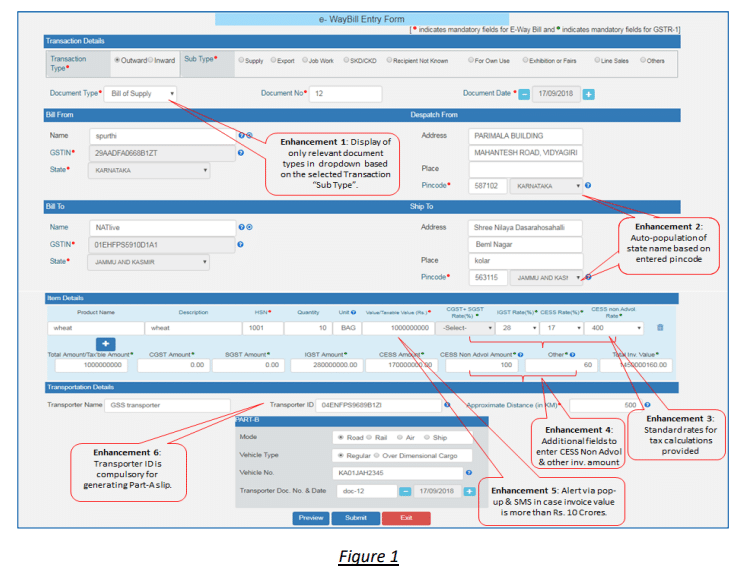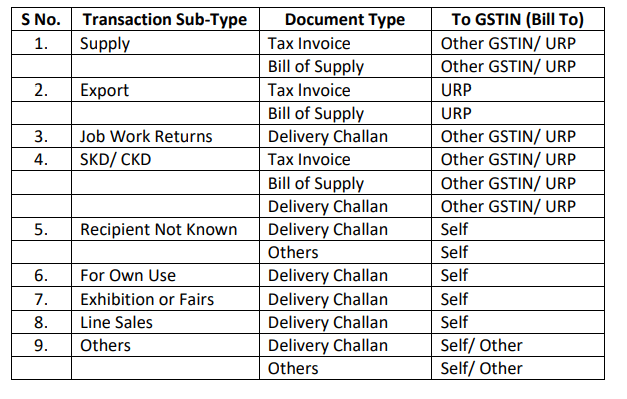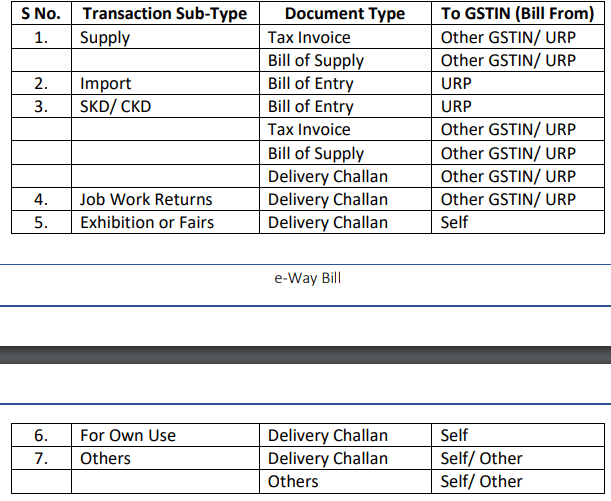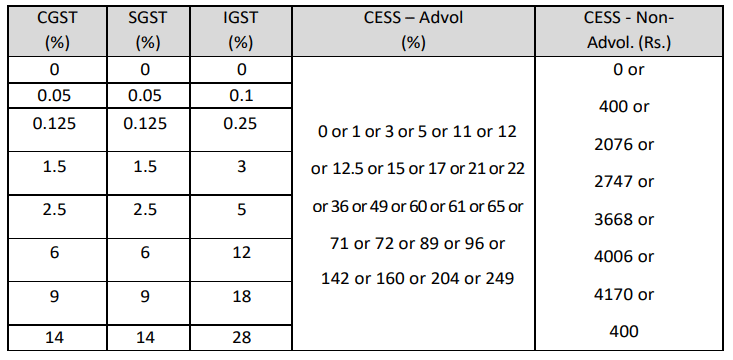GST Audit Checklist
we have compiled GST Audit Checklist
GST Audit Checklist : Invoice
HSN Codes
HSN code would be required to be mentioned in the Tax Invoices to be issued in the new financial year 2018-2019 in the manner stated below – Refer notification no. 12/2017-CT dated 28.06.2017
- Taxpayers with turnover of upto Rs.1.5 crore may not mention HSN Code in the tax invoices
- Taxpayers with turnover of more than Rs.1.5 crore but upto Rs.5 crore shall mention 2 digit HSN code in the tax invoices
- The taxpayers with turnover of more than Rs.5 crore shall use 4-digit HSN code in the tax invoices
Invoice Series
GST Tax Invoice series must be unique for the Financial Year. Rule 46(b) of CGST Rules 2017 narrates such provision as folloe
Subject to rule 54, a tax invoice referred to in section 31 shall be issued by the registered person containing the following particulars, namely,—
| (b) |
|
a consecutive serial number not exceeding sixteen characters, in one or multiple series, containing alphabets or numerals or special characters-hyphen or dash and slash symbolised as “-” and “/” respectively, and any combination thereof, unique for a financial year; |
Time for issue of Tax Invoice
Taxpayers should ensure that Tax Invoice and other documents are issued as per the provisions mentioned in Section 31 of CGST Act 2017
Time of Supply under GST
GST Audit Checklist :Carry forward of Cenvat /VAT Credit : TRAN
Audit Checklist :
Auditor should check :-
- Whether the person have filed TRANS-1 and the said form has carried forward all the accumulated credits appearing as closing balance in the service tax returns/Excise /VAT returns ?
GST Audit Checklist : Registration
Audit Checklist :
Auditor should check :-
- Is Certificate of registration prominently displayed in all locations where business was done?
- Is GSTIN no. Included along with the name of the business in displays?
GST Audit Checklist : Capital Goods
As per Section 16(3) of CGST Act 2017
Where the registered person has claimed depreciation on the tax component of the cost of capital goods and plant and machinery under the provisions of the Income-tax Act, 1961 (43 of 1961), the input tax credit on the said tax component shall not be allowed.
Audit Checklist :
While calculating depreciation on the capital goods (other than building), if the ITC has been claimed, then auditor has ensure that the tax amount should to be ignored.
GST Audit Checklist : Input Tax Credit
Audit Checklist :
Auditor should check :-
- List of major Input services /inputs on which the company takes Input Tax Credit
- Check to ensure SGST ITC is not utilized against
- Whether the person has taken the Input Tax Credit in respect of input and capital goods and Services on the basis of proper duty paying documents, containing all particulars as prescribed by CGST Rules read with section 31 of the CGST Act, 2017, i.e.,serially numbered invoice / bill not exceeding sixteen characters, containing the requisite information like, Name, address and GST Number of recipient, Name, address and Goods and Services Tax No. of supplier , date of issue, HSN code of goods , Services , etc.?
- In case the registered recipient has failed to make payment (full or part) to the registered supplier within a period of 180 days from the date of invoice, proportionate input tax credit to the extent of such non-payment has to be reversed by the registered recipient – Section 16(2) of CGST Act read with Rule 37(1) of CGST Rules 2017
Section 17(1) of CGST Act Where the goods or services or both are used by the registered person partly for the purpose of any business and partly for other purposes, the amount of credit shall be restricted to so much of the input tax as is attributable to the purposes of his business.
Audit Checklist :
Auditor should check :-
- Input tax credit has been used in respect of supplies affected for Business purpose only as per Rule 42 and 43 of CGST Rules?
Section 17(2) of CGST Act : Where the goods or services or both are used by the registered person partly for effecting taxable supplies including zero-rated supplies under this Act or under the Integrated Goods and Services Tax Act and partly for effecting exempt supplies under the said Acts, the amount of credit shall be restricted to so much of the input tax as is attributable to the said taxable supplies including zero-rated supplies.
Audit Checklist :
Auditor should check :-
Input Tax Credit : Blocked
Section 17(5) of CGST Act , provides list of supply on which Input Tax Credit can not be claimed.
Audit Checklist :
Input Tax Credit : Matching
Audit Checklist :
- Month wise reconciliation of ITC availed in the Books vs. GSTR 3B should be done.
- Month wise reconciliation of ITC (B2B) availed in GSTR 3B Vs. ITC auto-populated in Form GSTR 2A should be done. Any variance should be adjusted in Form GSTR 3B for March’2018 or in subsequent months GSTR 3B return.
- Timing difference and value difference should be identified and appropriate action to be taken
Input Tax Credit : Input Service Distributor
Audit Checklist :
Auditor should check :-
- Whether ITC distributed is in compliance to Section 20 of the CGST Act 2017 (Input Service Distributor ) If answer to above is negative, provide the discrepancy in the distribution and reasons thereof.
- An ISD should ensure that ITC is distributed to the recipients in the same month it is available for distribution – Rule 39 of CGST Rules 2017
- Amount of GST Input Tax credits received from Input Service Distributor, if any together with address of the unit from which it is received.
- Reconciliation of ITC (B2B) auto-populated in Form GSTR 6A Vs. Books should be done
Input Tax Credit Checklist
Refer GST Input Tax Credit Review Audit –
GST Audit Checklist : Refund
General Point of Refund
Audit Checklist :
- A registered person making normal taxable supply cannot claim refund of unutilised ITC as on 31st March 2018. The same has to be compulsorily carried forward to the next tax period.
- Taxpayers having excess balance in electronic cash ledger which is not planned to be utilised in the the near future may be claimed as refund.
Refund of Export of Services
Section 2(6) of IGST Act :- export of services” means the supply of any service when,—
(i) the supplier of service is located in India;
(ii) the recipient of service is located outside India;
(iii) the place of supply of service is outside India;
(iv) the payment for such service has been received by the supplier of service in convertible foreign exchange; and
(v) the supplier of service and the recipient of service are not merely establishments of a distinct person in accordance with Explanation 1 in section 8;
Case Law : GST applicable on Overseas Education Advisory to students in India : AAR
Audit Checklist :
Auditor should check :-
- Are services provided outside India? If Yes, Please specify nature of Service and amount involved
- Value of services exported
- With payment of IGST and claimed refund
- Without payment of IGST under the cover LUT or Bond and claimed refund
- whether a transaction is export of service, then only claim the benefit of refund claim on export where export is made with/without payment of tax but after furnishing bond of LUT in the latter case
- If export is made without IGST , Check LUT / Bond has been given before Export
- Check refund claim
- Is the payment for services exported received by the service provider in convertible foreign currency within the time limit prescribed by RBI? If not, give details.
GST Audit Checklist : Import of Services
Section 2(11) of IGST Act 2017 “import of services” means the supply of any service, where—
(i) the supplier of service is located outside India;
(ii) the recipient of service is located in India; and
(iii) the place of supply of service is in India;
Audit Checklist :
Auditor should check :-
- Whether IGST has been paid on ‘import of services’?
GST Audit Checklist : Job Work
As per Rule 45(3) of CGST Rules 2017
The details of challans in respect of goods dispatched to a job worker or received from a job worker or sent from one job worker to another during a quarter shall be included in FORM GST ITC-04 furnished for that period on or before the twenty-fifth day of the month succeeding the said quarter or within such further period as may be extended by the Commissioner by a notification in this behalf:
Provided that any extension of the time limit notified by the Commissioner of State tax or the Commissioner of Union territory tax shall be deemed to be notified by the Commissioner.
Audit Checklist :
GST Audit Checklist : Accounts and Records
Taxpayer has to maintain accounts and records in terms of Section 35 -36 of the CGST Act, 2017 read with Rule 56 to 58 of the CGST Rules, 2017.
Audit Checklist :
Auditor should check :-
- List of Books of Accounts maintained
- Places where accounts
GST Audit Checklist : GST Returns
Audit Checklist :
Auditor should check :-
- Whether GST returns are filed on due Date ? : Refer GST return Due dates
- The total turnover of outward supplies declared in the returns including all the outward supplies taxable under GST Act effected during the year.
- The total turnover of inward supplies declared in the returns including all the inward supplies taxable under GST Act made during the year.
- The deductions from the total turnover including deduction on account of sales /supply returns claimed in the returns which are to be in conformity with the provisions of the law.
- The adjustment to turnover of outward supplies and inward supplies has to be based on the entries made in the books of account maintained for the year.
- The classification of outward goods/services supplied and inward supplies, rate of tax applicable and computation of output tax and input tax , Input Tax Reversals and net tax payable as shown in the return has to be certified as correct.
- Whether the registered person have filed the applicable returns on timely basis as notified by the Government?
- Is GSTR 1 / GSTR 3B Returns etc tallied with books of accounts?
- Return filing cycle :Auditor should check with the aggregate turnover for the FY 2017-2018 and the projected aggregate turnover for the FY 2018-2019 in order to determine the return filing cycle for the FY 2018-2019:
- If the aggregate turnover is above Rs.1.5 crore then the taxpayers have to file monthly return.
- If the aggregate turnover is upto Rs.1.5 Crore then the taxpayers have an option to file the quarterly
- Taxpayer can choose any of the option, but once selected the option cannot be changed for the financial year.
GST Audit Checklist : GST Reverse Charge
Under Reverse Charge Mechanism , obligation to discharge GST lies on the service receiver/ recipient of supply. RCM under GST depends on the nature of supply and/or nature of supplier .
Compulsory Reverse Charge based on nature of Supply : Section 9(3) of CGST Act / Section 5(3) of the IGST Act specify categories of supply of goods or services or both as notified by Government on recommendations of the Council on which RCM is applicable.
Reverse charge on certain specified supplies of goods : Notification No.4/2017-Central Tax (Rate) & 4/2017 Integrated Tax (Rate) Dated 28th June, 2017 with Amendments
Reverse charge on certain specified supplies of Services : Notification No. 13/2017- Central Tax ( Rate ) & 10/2017 Integrated Tax (Rate) dated 28.06.2017 with Amendments
Intra-State inward supplies received from unregistered person
Compulsory Reverse Charge based on nature of supplier. : Section 9(4) of CGST specify that if supply of taxable goods or services or both by an unregistered supplier to a registered person then GST shall be paid by recipient under Reverse Charge Mechanism .
w.e.f 01.07.2017 Reverse charge mechanism under section 9(4) CGST will be applicable where the aggregate value of such supplies of goods or service or both received by a registered person from any or all the suppliers, who is or are not registered, exceeds Rs 5000 in a day. [Notification No.8/2017-Central Tax (Rate) dated 28.06.2017]
Note- w.e.f 13.10.2017 , Section9 (4) of CGST Act and applicability deffered till 30.06.2018
[ Notification No.38/2017-Central Tax (Rate) dated 13.10.2017 and 10/2018 Central Tax (Rate) 23rd March, 2018 ]
Inter State inward supplies received from unregistered person
Compulsory Reverse Charge based on nature of supplier : Section 5(4) of the IGST Act specify that if supply of taxable goods or services or both by an unregistered supplier to a registered person then GST shall be paid by recipient under Reverse Charge Mechanism .
Note- w.e.f 13.10.2017 : Govt has exempted the inter-State supply of goods or services or both received by a registered person from any supplier, who is not registered, from the whole of the integrated tax leviable u/s 5(4) of IGST Act
Thus Section 5(4) of CGST Act and applicability deffered till 30.06.2018
[ Notification No. 32/2017 – Integrated Tax (Rate) dated 13th October, 2017 and Notification No. 11/2018-Integrated Tax (Rate) ,dt. 23-03-2018
Audit Checklist :
Auditor should check :-
- Whether registered person has followed the requirement of reverse charge under Section 9(3) and 9(4) of the CGST and u/s 5(3) and 5(4) of IGST Act for each GST registered places ?
- Whether registered person has made GST payment under reverse charge on supplies received from unregistered supplier from 1st july 2017 to 12 th October 12,2017 for
- Intra Sate Purchases from unregistered person if aggregate value of supplies of goods or services or both received by a registered person from any or all the suppliers, who is or are not registered, exceeds Rs. 5000/- in a day
- Inter State Purchases from unregistered person
- Whether in respect of each inward supply where no tax has been paid, is there is a clear disclosure made to the auditors as to the reasons for the tax position taken in each case? Auditor may examine, if the tax position taken requires to be reported in the audit report or other communication?
Input Tax Credit Can be used to pay Output Tax
Section 49(4) of CGST Act 2017 : The amount available in the electronic credit ledger may be used for making any payment towards output tax under this Act or under the Integrated Goods and Services Tax Act in such manner and subject to such conditions and within such time as may be prescribed.
Tax Payable under Reverse charge is not Output Tax
Section 2(82) of CGST Act 2017“output tax” in relation to a taxable person, means the tax chargeable under this Act on taxable supply of goods or services or both made by him or by his agent but excludestax payable by him on reverse charge basis;
Thus Input Tax credit can not be used to pay output Tax under Reverse Charge. It has to be paid in cash/Bank.
Section 2(62) of CGST Act 2017:-
“input tax” in relation to a registered person, means the central tax, State tax, integrated tax or Union territory tax charged on any supply of goods or services or both made to him and includes—
(a) the integrated goods and services tax charged on import of goods;
(b) the tax payable under the provisions of sub-sections (3)and (4)of section 9;
(c) the tax payable under the provisions of sub-sections (3)and (4)of section 5 of the Integrated Goods and Services Tax Act;
(d) the tax payable under the provisions of sub-sections (3)and (4)of section 9 of the respective State Goods and Services Tax Act; or
(e) the tax payable under the provisions of sub-sections (3)and (4)of section 7 of the Union Territory Goods and Services Tax Act,
but does not include the tax paid under the composition levy;
You can take Input Tax credit after Reverse Charge has been paid through cash/Bank.
Audit Checklist :
Auditor should check :-
- Whether the credit taken under reverse charge mechanism is only after making payment of GST?
GST Audit Checklist : GST Payments
Audit Checklist :
Auditor should check :-
- Whether payment and ledger entries is made in terms CGST Act and payment rules given in CGST Rules, 2017?
- If Tax is paid belatedly, specify interest paid on delayed payment under Section 50 of the CGST Act,2017
- Whether Tax wrongfully collected and paid to Central or State Government (interstate supply considered as intra state supply or vice versa)? If Yes, state the details of transaction (quantum)
GST Audit Checklist : Composition Scheme
Audit Checklist :
- Check whether the whether registered person opting composition scheme is eligible to opt for GST Composition Scheme . Read Composition Scheme under GST – Analysis
- Check Whether registered person opting composition scheme are having multiple registrations in different states with the same PAN (Distinct persons)? If yes, all other entities registered with the same PAN must also opt for composition scheme.
- Check correct GST has been paid under GST Composition scheme. GST Composition Scheme Rate Reduced w.e.f 01.01.2018 [ Video by TaxHeal ]
- Check whether registered person opting composition scheme has filed quarterly returns in GSTR 4. Read GSTR 4 Due Dates.
- Check whether registered person opting composition scheme has Issued Bill of supply for every supply in lieu of tax invoice.
- Check whether registered person opting composition scheme mention the words ―composition taxable person, not eligible to collect tax on supplies‖ at the top of every bill of supply issued by you.
- Check whether registered person opting composition scheme mention the words ―composition taxable person‖ on every notice or signboard displayed at a prominent place at his principal place of business and at every additional place or places of business.
- Check whether taxpayer has file GST CMP 4 if he had opted out of the Composition Schme? Taxpayer can opt out of composition scheme anytime by filing FORM GST CMP-04 in terms of Rule 6(3) of CGST Rules. on GST Common Portal ( www.gst.gov.in) within seven days of occurrence of any such event warranting exit from the scheme.
- On withdrawal from the composition, take Credit of tax paid on the stock lying with you by filing Form GST ITC-01 within 30 days from the date when the option for withdrawal was exercised, on the common portal, containing details of the stock of inputs and inputs contained in semi-finished or finished goods held in stock.
- GST composition Scheme changes w.e.f 13.10.2017
GST Audit Checklist : Anti-profiteering guidelines
Section 171 (1) of CGST Act : Any reduction in rate of tax on any supply of goods or services or the benefit of input tax credit shall be passed on to the recipient by way of commensurate reduction in prices.
Audit Checklist :
Auditor should check whether anti-profiteering guidelines issued under Section 171 of CGST Act 2017 complied?

Note : along with above GST Audit Checklist , you should refer all the relevant circular and notifications on Govt website of CBEC
Related Post on Audit
Audit Checklist
Checklist for internal / concurrent audit of Govt business Agency Banks
33 Points Checklist for Statutory Bank Audit
Concurrent Audit of Banks Checklist
Bank Audit-A Practical Guide for Bank Auditors -4th Edition Book 2018 : Taxmann
Handbook on Internal Auditing -2016 book by CA Kamal Garg
The post GST Audit Checklist : User Guide on GST Audit appeared first on Tax Heal.
from Tax Heal https://ift.tt/2ySNywV




